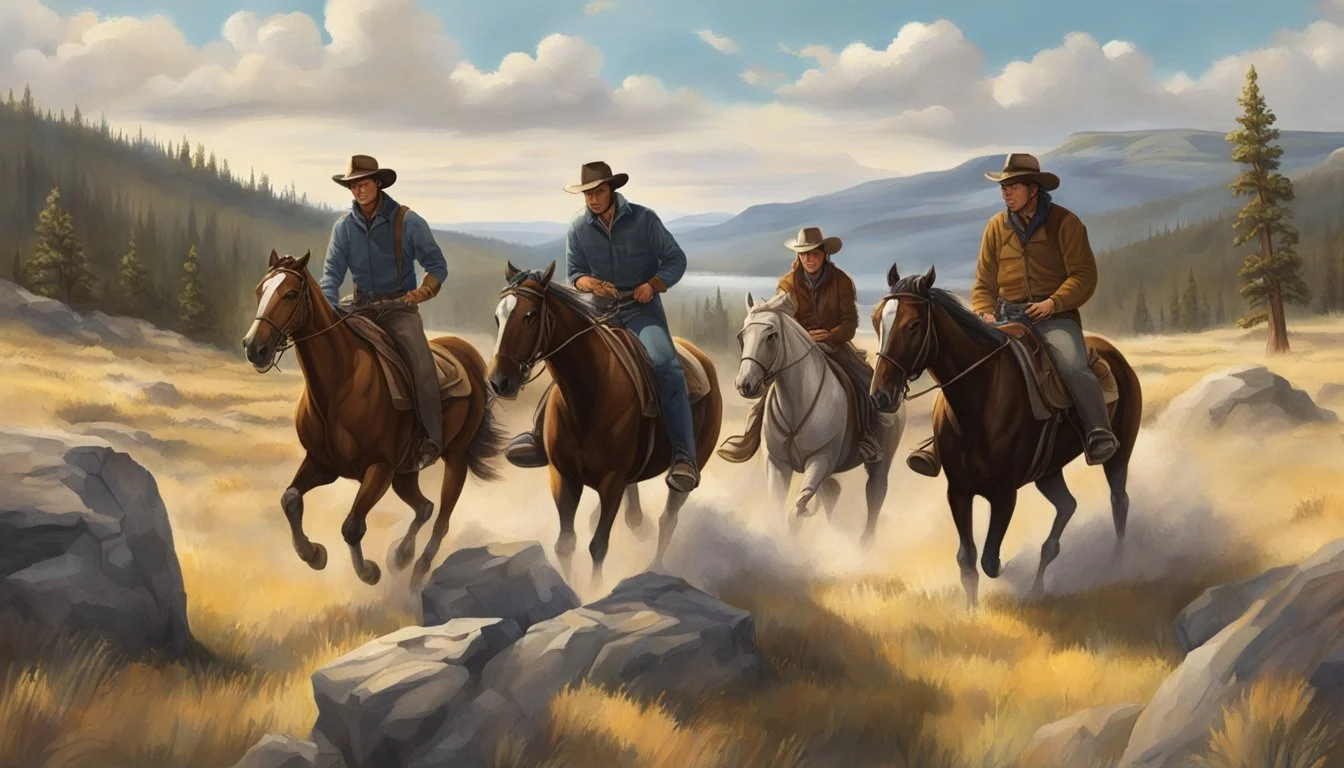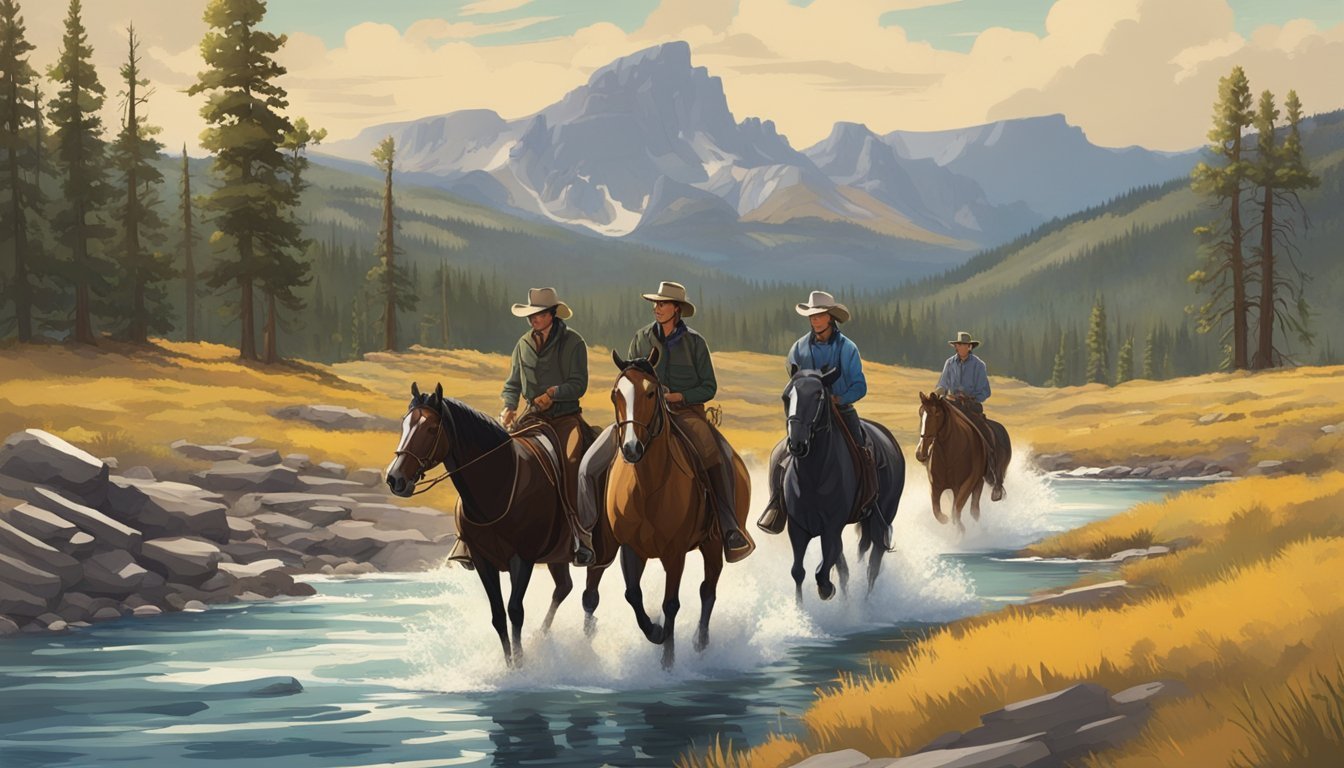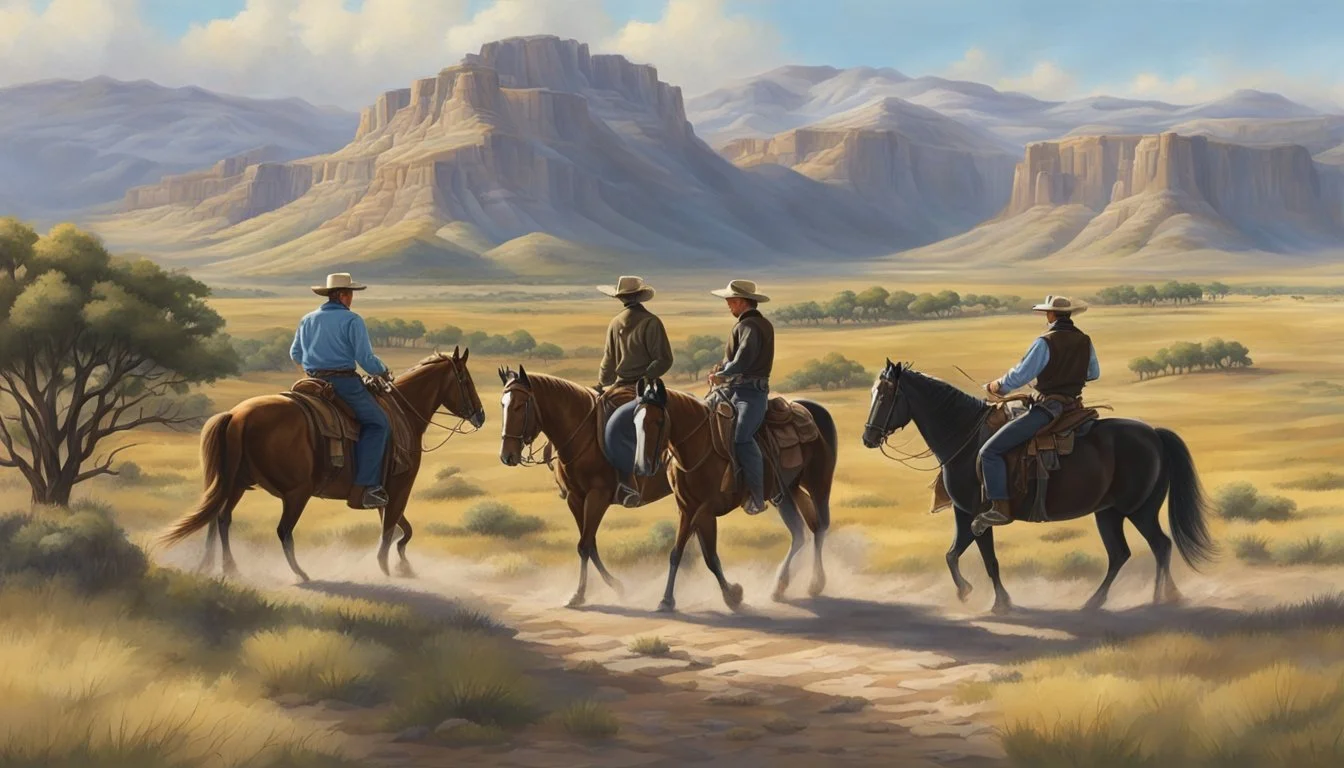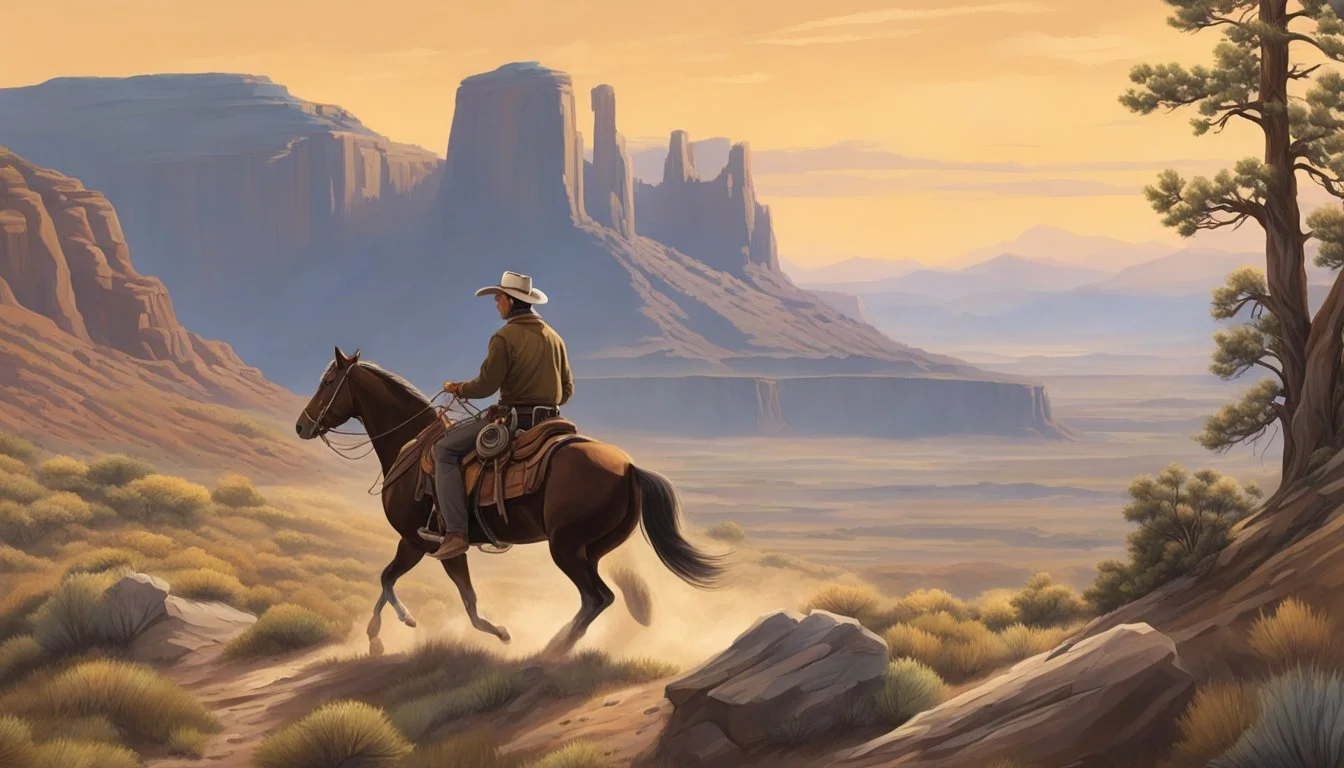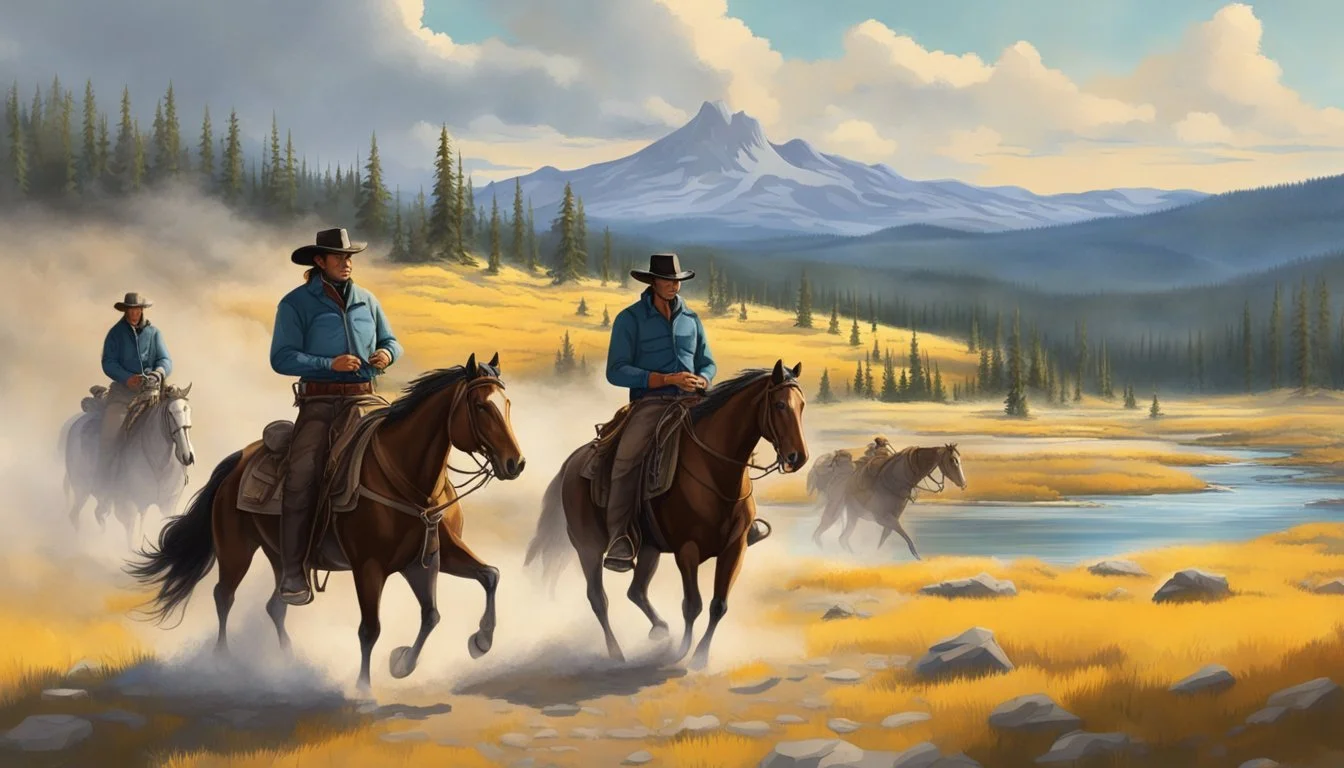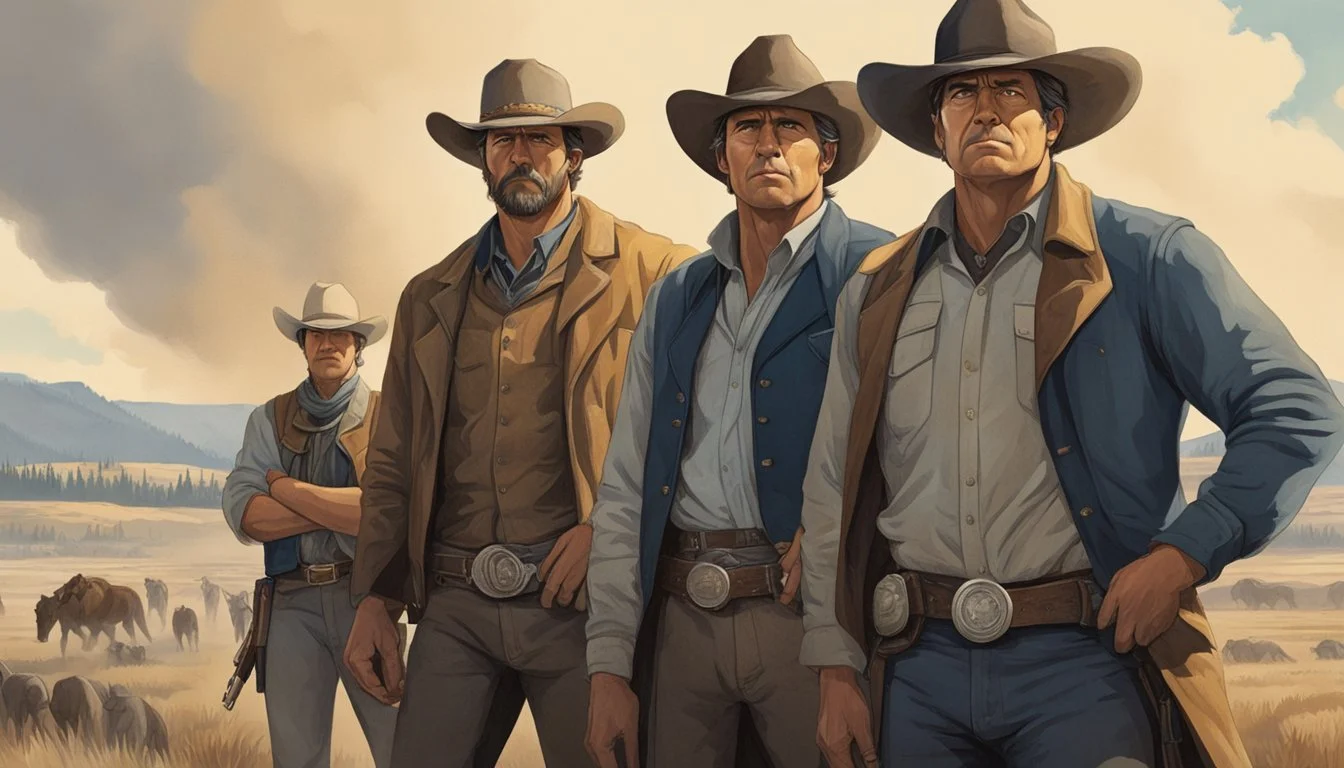Dutton Dynasty Exposed: Shocking Secrets of Yellowstone's Wealth and Power!
The Dutton family saga in Yellowstone captivates audiences with its raw portrayal of power, wealth, and legacy in rural Montana. Set against the breathtaking backdrop of America's first national park, the series delves into the complexities of maintaining a vast ranching empire across generations.
The Dutton Dynasty serves as a compelling case study on the intricacies of preserving and transferring generational wealth. Through their triumphs and struggles, viewers gain insight into the challenges faced by families seeking to protect their heritage and assets for future generations.
Yellowstone's exploration of legacy extends beyond financial considerations, touching on themes of tradition, adaptation, and the evolving landscape of rural America. As the Duttons fight to maintain their way of life, the show prompts reflection on the true meaning of wealth and the sacrifices required to preserve a family's legacy in an ever-changing world.
Setting the Scene: Historical Context
The Dutton family's saga spans over a century of American history, from the late 1800s to the present day. Their journey reflects the broader transformation of the American West, encompassing pivotal events and societal shifts that shaped the nation.
The American Frontier and the Dutton Origins
The Dutton story begins in the aftermath of the Civil War. James Dutton, a veteran of the conflict, led his family westward in 1883. This era marked the final push of frontier settlement, as pioneers sought new opportunities in the untamed territories.
Montana, still wild and sparsely populated, offered both promise and peril. The Duttons faced harsh conditions, conflicts with Native American tribes, and competition from other settlers. Their perseverance laid the foundation for what would become the Yellowstone Dutton Ranch.
Westward Expansion and Land Acquisition
As the American West opened up, the Duttons seized opportunities to expand their holdings. The Homestead Act of 1862 allowed settlers to claim 160 acres of public land for free, provided they lived on and improved it.
The Duttons likely took advantage of such policies to grow their ranch. They may have also purchased land from struggling neighbors or acquired it through less savory means, as was common in the era.
By the early 1900s, the Duttons had established themselves as significant landowners in Montana.
The Struggles During the Great Depression and Prohibition Era
The 1920s and 1930s brought new challenges to the Dutton dynasty. Prohibition (1920-1933) disrupted social norms and spawned widespread illegal activities. The ranch may have been involved in bootlegging or faced pressure from criminal elements.
The Great Depression hit rural America hard. Farmers and ranchers struggled with plummeting prices and severe drought. The Duttons likely weathered these storms through diversification, resilience, and possibly some ethically questionable decisions.
This era tested the family's resolve and business acumen, forcing them to adapt to survive in a rapidly changing world.
Main Characters and Their Journeys
The Dutton family's saga revolves around complex characters whose personal struggles shape the fate of their ranch. Each member plays a crucial role in the ongoing battle to preserve their legacy and way of life.
John Dutton and His Role as Patriarch
John Dutton, portrayed by Kevin Costner, stands as the resolute patriarch of the Dutton family. He fiercely protects the Yellowstone Ranch, which has been in his family for generations. John's unwavering commitment to the land often puts him at odds with developers, politicians, and even his own children.
His leadership style is both commanding and nurturing, as he prepares his offspring to eventually take over the ranch. John's journey is marked by difficult decisions that test his morals and family loyalties.
Beth Dutton: Loyalty and Ambition
Beth Dutton emerges as a formidable force within the family. Her sharp intellect and ruthless business acumen make her a valuable asset in the fight to protect Yellowstone Ranch. Beth's unwavering loyalty to her father, John, drives many of her actions.
Her personal journey involves confronting past traumas and navigating a complex relationship with Rip Wheeler. Beth's ambitious nature often leads her to make bold, sometimes controversial moves to secure the family's interests.
Kayce Dutton: Conflict and Identity
Kayce Dutton's story is one of internal conflict and search for identity. As a former Navy SEAL, he struggles to balance his duties to the ranch with his responsibilities to his wife and son. Kayce's journey involves reconciling his Native American heritage through his marriage to Monica with his role in the Dutton dynasty.
His character arc explores themes of loyalty, family, and the clash between traditional ranching values and modern realities. Kayce's decisions often place him at the crossroads of different worlds.
Jamie Dutton: Power Struggles and Redemption
Jamie Dutton's path is marked by a constant quest for approval and power. As the adopted son of John Dutton, he grapples with issues of belonging and identity within the family. Jamie's legal expertise makes him a key player in the ranch's political battles.
His journey involves navigating complex relationships with his siblings, especially Beth, and making choices that often put him at odds with the family's interests. Jamie's story arc explores themes of ambition, betrayal, and the possibility of redemption.
The Dutton Dynasty's Hold on the Land
The Dutton family's connection to their vast Montana ranch forms the core of their identity and power. Their multi-generational struggle to maintain control of the land intersects with broader issues of conservation, Native American rights, and the changing American West.
Dutton Ranch and Ranching Lifestyle
The Yellowstone Dutton Ranch sprawls across hundreds of thousands of acres in Montana. This massive property serves as both the family's home and primary source of income. The Duttons run a large-scale cattle operation, employing traditional ranching methods alongside modern techniques.
Ranch life shapes every aspect of the Dutton family's existence. They face constant challenges from harsh weather, predators, and market fluctuations. The demanding nature of ranching reinforces their deep connection to the land and their fierce determination to protect it.
The ranch's proximity to Yellowstone National Park adds another layer of complexity. The Duttons must navigate strict wildlife management regulations while maintaining their livestock operations.
Land Rights and Preservation Efforts
The Duttons view themselves as stewards of the land, committed to preserving it for future generations. This perspective often puts them at odds with developers and government agencies seeking to exploit or regulate the property.
The family engages in ongoing legal battles to protect their property rights. They fight against eminent domain claims, zoning changes, and environmental regulations that threaten their way of life.
Conservation efforts play a key role in the Duttons' land management strategy. They implement sustainable grazing practices and work to maintain wildlife habitats on their property. This approach helps justify their continued ownership of such a vast tract of land in the face of increasing development pressures.
Conflict with Native American Communities
The Dutton Ranch's boundaries overlap with the fictional Broken Rock Indian Reservation, leading to ongoing tensions. The Native American community views the Duttons as occupying stolen land, while the Duttons see themselves as rightful owners through generations of use.
Land disputes between the ranch and the reservation frequently escalate into legal and sometimes physical confrontations. These conflicts highlight the complex history of land ownership in the American West and the ongoing struggle for indigenous rights.
The Duttons' efforts to maintain control of their property often come into direct conflict with tribal efforts to reclaim ancestral lands. This tension forms a central element of the broader narrative about power, privilege, and the legacy of colonialism in the region.
Generational Wealth and the American Dream
The Dutton family's saga in Yellowstone explores the complexities of inherited wealth and power in modern America. Their struggle to maintain their ranch embodies both the promise and perils of passing down assets through generations.
Carrying the Family Legacy
The Duttons' dedication to preserving their ranch exemplifies the weight of inherited responsibility. John Dutton views the land as more than property - it's a living legacy entrusted to him by his ancestors. This mindset shapes his decisions and relationships, often putting family duty above personal desires.
His children grapple with their roles in maintaining this legacy. Beth embraces her father's ruthless business tactics, while Kayce struggles to balance ranch life with his own family. Jamie's ambition leads him to seek power beyond the ranch, creating tension within the family.
The show highlights how generational wealth can be both a blessing and a burden, influencing life choices and family dynamics across decades.
Wealth, Power, and Survival
Yellowstone portrays the fierce competition for resources in the American West. The Duttons' vast landholdings grant them significant political and economic influence, which they wield to protect their interests.
Their wealth provides advantages but also makes them targets. Rival ranchers, developers, and Native American tribes all vie for control of the land and its resources. This constant threat of loss drives the Duttons to extreme measures to maintain their position.
The show explores how accumulated wealth can create a cycle of power and conflict. It raises questions about the sustainability of such dynasties in a changing world and the moral compromises made to preserve them.
The Influence of Yellowstone on Modern Westerns
Yellowstone has revitalized the Western genre for contemporary audiences. It blends traditional cowboy imagery with modern power struggles and complex characters.
The show's portrayal of generational wealth in a rural setting offers a fresh perspective on the American Dream. It challenges the myth of the self-made rancher, showing how family connections and inherited assets shape success.
Yellowstone's popularity has sparked renewed interest in stories about land ownership, resource conflicts, and family legacies in the West. Its influence can be seen in other productions exploring similar themes, contributing to a new wave of modern Westerns that resonate with today's viewers.
Cultural and Social Commentary
Yellowstone's depiction of Montana's cultural landscape offers a nuanced exploration of modern American issues. The show tackles complex themes surrounding land ownership, traditional values, and societal change.
The Portrayal of Native American Tribes
Yellowstone presents Native American characters and their struggles with respect and depth. The series highlights conflicts between tribal interests and the Dutton ranch, touching on historical land disputes and sovereignty issues. Chief Thomas Rainwater emerges as a formidable opponent to John Dutton, representing tribal efforts to reclaim ancestral lands.
The show explores the complexities of reservation life, including economic challenges and cultural preservation. It also depicts the diverse perspectives within Native communities, avoiding one-dimensional stereotypes.
Yellowstone's portrayal has sparked discussions about authentic representation in media. While some praise the series for its nuanced approach, others critique certain aspects as perpetuating stereotypes.
Environmental Concerns and Ranching Impact
Yellowstone doesn't shy away from addressing environmental issues tied to ranching. The series portrays the delicate balance between preserving natural habitats and maintaining a working ranch.
Wildlife conservation plays a significant role, with storylines involving wolf reintroduction and conflicts with local ranchers. The show highlights the challenges of coexisting with predators and maintaining livestock.
Water rights and land use disputes feature prominently, reflecting real-world tensions in the American West. The series explores the environmental impact of development projects, showcasing the clash between economic interests and ecological preservation.
Yellowstone presents these issues without taking a clear stance, allowing viewers to form their own opinions on complex environmental matters.
The Changing Face of Modern Westerns
Yellowstone reinvents the Western genre for contemporary audiences. It blends traditional cowboy imagery with modern elements, creating a neo-Western drama that resonates with viewers.
The series tackles current issues like corporate land grabs and political corruption, updating familiar Western themes for the 21st century. It explores the erosion of the cowboy way of life in the face of urbanization and technological advancement.
Yellowstone's characters embody both classic Western archetypes and complex modern individuals. This fusion has attracted a diverse audience, bridging the gap between traditional Western fans and newcomers to the genre.
The show's popularity has sparked a revival of Western-themed content in television and film, influencing the entertainment industry's portrayal of rural American life.
The Broader Yellowstone Universe
The Yellowstone franchise has expanded beyond the original series, creating a rich tapestry of interconnected stories. These additional series explore different time periods and characters within the Dutton family saga, offering deeper insights into their legacy and the evolution of the American West.
Prequel and Spinoff Series Dynamics
Taylor Sheridan's vision for Yellowstone has given rise to several prequel and spinoff series. "1883" takes viewers back to the Dutton family's origins, following James Dutton as he leads his family westward to establish the Yellowstone Dutton Ranch. "1923" continues the family saga, exploring the challenges faced by a new generation of Duttons during Prohibition and the Great Depression.
These prequels provide historical context to the modern-day events of Yellowstone, enriching the overall narrative. They showcase the family's enduring connection to the land and their struggles to maintain power across generations.
Expanded Storylines and Character Development
The expanded Yellowstone universe allows for deeper exploration of characters and themes. Spinoff series delve into the lives of supporting characters, fleshing out their backstories and motivations. This approach adds layers to the main storyline and creates a more immersive experience for viewers.
Yellowstone Season 5 continues to build on the foundation laid by these additional series. The interconnected nature of the shows enables viewers to trace the evolution of the Dutton family and their ranch across different eras. This multi-generational approach highlights the lasting impact of decisions made by earlier Duttons on their present-day descendants.
Impact on Television and Media
Yellowstone has reshaped the television landscape, becoming a cultural phenomenon and influencing casting trends. The show's success has propelled Paramount Network to new heights and attracted A-list talent to the small screen.
Yellowstone's Success on Paramount Network
Yellowstone emerged as Paramount Network's flagship series, consistently drawing massive viewership. The show's popularity revitalized interest in Western-themed dramas and rural American stories. Paramount Network saw a significant boost in ratings and audience engagement across its programming lineup. Yellowstone's success also led to the creation of spin-off series and prequels, expanding the franchise's reach. The show's impact extended beyond television, influencing tourism in Montana and sparking conversations about land use and conservation.
Casting Influence and Ensemble Cast Synergy
Yellowstone's casting choices set new standards for television productions. Kevin Costner's lead role as John Dutton attracted other high-profile actors to the small screen. This trend continued with spin-offs featuring Helen Mirren and Harrison Ford. The show's ensemble cast demonstrated exceptional chemistry, elevating performances across the board. Yellowstone's success paved the way for more cinematic storytelling on television, blurring the lines between film and TV production values. The series also highlighted the importance of authentic representation in portraying rural American life and Native American characters.

